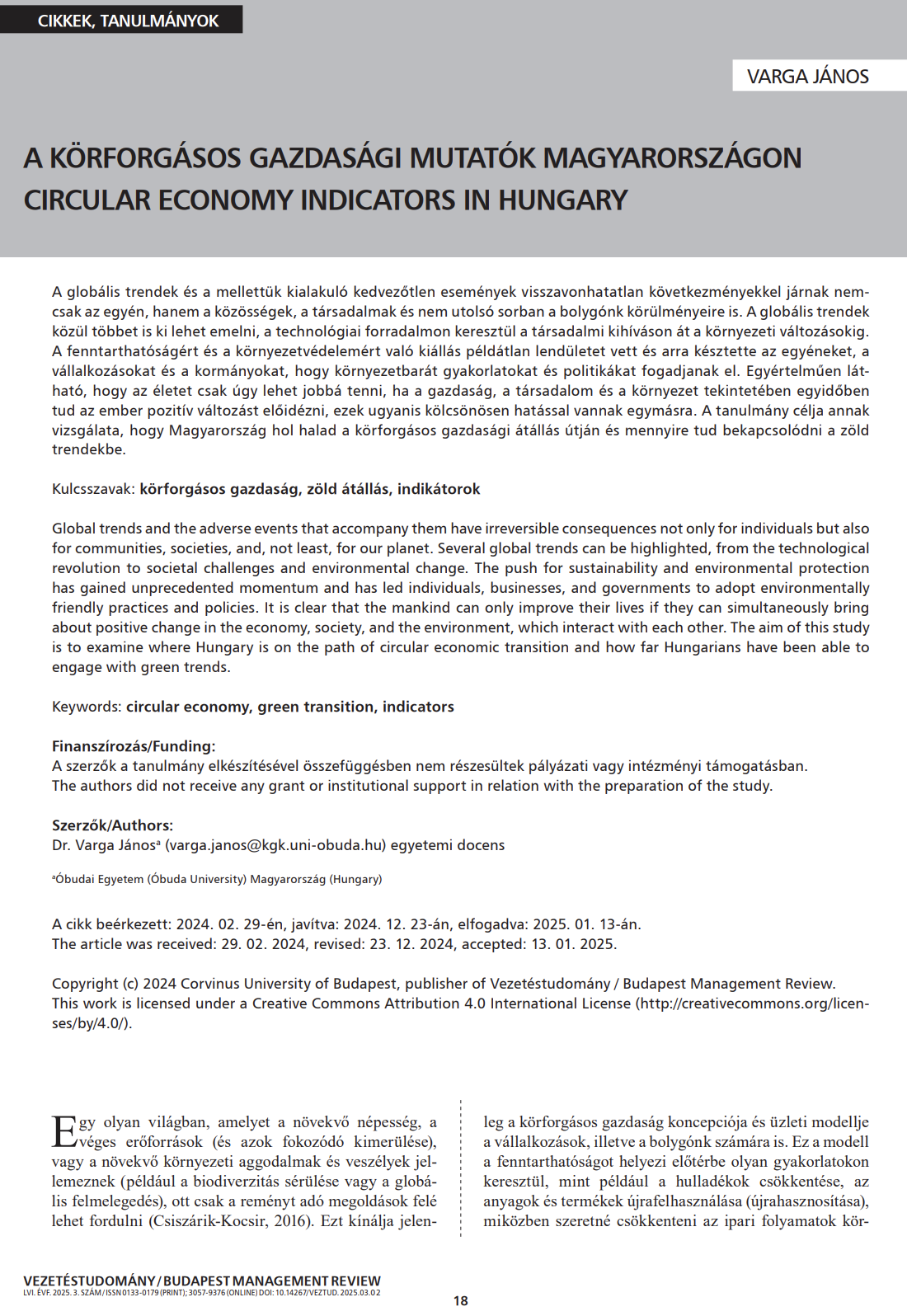A körforgásos gazdasági mutatók Magyarországon
DOI:
https://doi.org/10.14267/VEZTUD.2025.03.02Kulcsszavak:
körforgásos gazdaság, zöld átállás, indikátorokAbsztrakt
A globális trendek és a mellettük kialakuló kedvezőtlen események visszavonhatatlan következményekkel járnak nemcsak az egyén, hanem a közösségek, a társadalmak és nem utolsó sorban a bolygónk körülményeire is. A globális trendek közül többet is ki lehet emelni, a technológiai forradalmon keresztül a társadalmi kihíváson át a környezeti változásokig. A fenntarthatóságért és a környezetvédelemért való kiállás példátlan lendületet vett és arra késztette az egyéneket, a vállalkozásokat és a kormányokat, hogy környezetbarát gyakorlatokat és politikákat fogadjanak el. Egyértelműen látható, hogy az életet csak úgy lehet jobbá tenni, ha a gazdaság, a társadalom és a környezet tekintetében egyidőben tud az ember pozitív változást előidézni, ezek ugyanis kölcsönösen hatással vannak egymásra. A tanulmány célja annak vizsgálata, hogy Magyarország hol halad a körforgásos gazdasági átállás útján és mennyire tud bekapcsolódni a zöld trendekbe.
Letöltések
Hivatkozások
Arruda, E.H., Melatto, R.A.P.B., Levy, W., & de Melo Conti, D. (2021). Circular economy: A brief literature review (2015-2020). Sustainable Operations and Computers, 2, 79-86. https://doi.org/10.1016/j.susoc.2021.05.001.
Csiszárik-Kocsir, Á. (2016). A megújuló energiaforrások projektfinanszírozása a 2005 és 2015 között végrehajtott tranzakciók alapján. Journal of Central European Green Innovation, 4(3), 127-141. https://ageconsearch.umn.edu/record/253391/?v=pdf
Csiszárik-Kocsir, Á., & Lentner, Cs. (2023). Financial exclusion from the perspective of financial literacy in the digital world of the 21st century through the example of Hungary. Transformations in Business and Economics, 22(3), 266-280. https://tudasportal.uni-nke.hu/xmlui/handle/20.500.12944/21357
Ekins, P., Domenech, T., Drummond, P., Bleischwitz, R., Hughes, N. & Lotti, L. (2019). The Circular Economy: What, Why, How and Where. Studocu. https://www.studocu.vn/vn/document/truong-dai-hoc-ngoaithuong/business-economics/ekins-2019-circular-economy-what-why-how-where/67699481
European Environment Agency. (2021). Ecological footprint of European countries. www.eea.europa.eu/en/ analysis/indicators/ecological-footprint-of-european-countries
European Parliament. (2018). Hulladékkezelés az EU-ban. Trendek és statisztikák. https://www.europarl.europa.eu/news/hu/headlines/society/20180328STO00751/hulladekkezeles-az-eu-ban-trendek-es-statisztikak-infografika
European Parliament. (2023). Az üvegházhatású gázok kibocsátása az EU-ban. https://www.europarl.europa.eu/news/hu/headlines/society/20180301STO98928/uveghazhatasu-gazok-kibocsatasa-az-eu-ban-infografika
Garai-Fodor, M. (2023). Digitalisation trends based on consumer research. In Szakál, A. (Eds.), IEEE 17th International Symposium on Applied Computational Intelligence and Informatics SACI (pp. 349-352). IEEE Hungary Section. https://doi.org/10.1109/SACI58269.2023.10158614
Garai-Fodor, M., Vasa, L., & Jäckel, K. (2023). Characteristics of consumer segments based on perceptions of the impact of digitalisation. Decision Making: Applications in Management and Engineering, 6(2), 975- 993. https://doi.org/10.31181/dmame622023940
Geissdoerfer, M., Savaget, P., Bocken, N.M., & Hultink, E.J. (2017). The circular economy – a new sustainability paradigm? Journal of Cleaner Production, 143, 757-768. https://doi.org/10.1016/j.clepro.2016.12.048.
Horváth, A. (2019). Körforgásos gazdálkodás eszméi, a körkörös ellátási lánc menedzsment. Logisztikai Trendek és Legjobb Gyakorlatok, 5(2), 47-52. https://doi.org/10.21405/logtrend.2019.5.2.47
Kirchherr, J., Nadja Yang, N.H., Schulze-Spüntrup, F., Heerink, M.J., & Hartley, K. (2023). Conceptualizing the Circular Economy: An Analysis of 221 Definitions. Resources, Conservation and Recycling, 194, 107001. https://doi.org/10.1016/j.resconrec.2023.107001.
Korhonen, J., Honkasalo, A., & Seppälä, J. (2018). Circular economy: the concept and its limitations. Ecological Economics, 143(1), 37-46. https://doi.org/10.1016/j.ecolecon.2017.06.041
Kozma, D.E, Molnárné, B.K., & Molnár, T. (2021). Rangsoroljunk vagy nem? – A körforgásos gazdaság mérési lehetőségei és azok összehasonlítása az EU-tagországokban. Vezetéstudomány, 51(8-9), 63-77. https://doi.org/10.14267/VEZTUD.2021.09.05
Lamba, H.K., Kumar, N.S., & Dhir, S. (2024). Circular economy and sustainable development: a review and research agenda. International Journal of Productivity and Performance Management, 73(2), 497-522. https://doi.org/10.1108/IJPPM-06-2022-0314
Moraga, G., Huysveld, S., Mathieux, F., Blengini, G.A., Alaerts, L., Van Acker, K., & Dewulf, J. (2019). Circular economy indicators: what do they measure? Resources Conservation Recycling, 146, 452-461. https://doi.org/10.1016/j.resconrec.2019.03.045
Németh, K. (2021). A körforgásos gazdaság alapjai. Pannon Egyetemi Kiadó.
OECD. (2018). Global Material Resources Outlook to 2060. https://www.oecd.org/en/publications/global-material-resources-outlook-to-2060_9789264307452-en.html
Shooshtarian, S., Maqsood, T., Caldera, S., & Ryley, T. (2022). Transformation towards a circular economy in the Australian construction and demolition waste management system. Sustainable Production and Consumption, 30, 89-106. https://doi.org/10.1016/j.spc.2021.11.032
Silva, F.C., Shibao, F.Y., Kruglianskas, I., Barbieri, J.C., & Sinisgalli, P.A.A. (2019). Circular economy: analysis of the implementation of practices in the Brazilian network. Revista de Gestão, 26(1), 39-60. https://doi.org/10.1108/REGE-03-2018-0044
Stahel, W. (2016). The circular economy. Nature, 531, 435- 438. https://doi.org/10.1038/531435a
Szigeti, C., Remsei, S., & Bándy, K. (2023a). What are the Young People’s Perceptions of the Circular Economy? In Nedelko, Z., & Korez Vide, R. (Eds.), Conference Proceedings of the 7th FEB International Scientific Conference: Strengthening Resilience by Sustainable Economy and Business – Towards theSDGs (pp. 455- 462). University of Maribor Faculty of Economics and Business.
Szigeti, C., Remsei, S., & Bándy, K. (2023b). Körforgásos fogalmak és értékek: divat lesz-e az újrahasználat? In Vágány, J., & Fenyvesi, É. (Eds.), Multidiszciplináris kihívások, sokszínű válaszok: 11. Tudományos Szimpózium: absztraktfüzet (p. 65). Budapesti Gazdasági Egyetem. http://real.mtak.hu/id/eprint/165388
Tóth, T.G. (2023). A jövő körforgásos és platform gazdasága. Tallózó, 2(1), 109-112. https://doi.org/10.14267/VILPOL2023.01.14
Yale University. (2022). Environmental Performance Index. https://epi.yale.edu/epi-results/2022/component/epi

Downloads
Megjelent
Hogyan kell idézni
Folyóirat szám
Rovat
License
Copyright (c) 2025 Corvinus University of Budapest, publisher of Vezetéstudomány / Budapest Management Review

This work is licensed under a Creative Commons Attribution 4.0 International License.
Authors assign copyright to Vezetéstudomány / Budapest Management Review. Authors are responsible for permission to reproduce copyright material from other sources.

